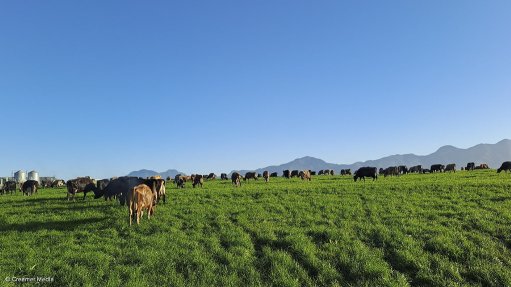Awsisa calls for municipal infrastructure maintenance, adherence to municipal water bylaws
South Africa’s water security is being undermined not only by climate-related pressures but also by the failure of many municipalities to maintain critical infrastructure and enforce water-related bylaws.
While water boards – members of the Water and Sanitation Institutions of South Africa (Awsisa) – are implementing essential infrastructure maintenance programmes, their efforts are frequently undermined by the poor state of municipal systems and a troubling lack of accountability.
“This crisis's core is a dual failure: infrastructure neglect and noncompliance with municipal water bylaws. This toxic combination threatens economic productivity, public health and environmental sustainability,” Awsisa said in a statement on Wednesday, pointing out that the consequences of this neglect are well known.
“South Africa loses nearly 47% of its treated water through leaks, ageing infrastructure and operational inefficiencies. Nonrevenue water costs municipalities an estimated R7.2-billion annually, while the broader economic drag may exceed R270-billion.”
Despite these losses, municipalities continue to underuse or return infrastructure grants, even as local systems deteriorate and communities face constant water outages.
The situation becomes particularly critical during high-demand seasons, such as spring and autumn, when fragile systems come under strain and often collapse under pressure.
“Inadequate infrastructure disrupts industrial output, weakens investor confidence and erodes the viability of small businesses. Meanwhile, communities, especially in under-resourced areas, bear the brunt of poor service delivery,” the association continued.
Infrastructure failures directly contribute to the spread of waterborne diseases such as cholera, dysentery and typhoid, overburdening the public health system and amplifying social inequality.
While technologies such as smart meters, leak detection systems and predictive maintenance tools hold significant promise, they cannot succeed in a context of poor governance.
“Without skilled professionals, clear accountability and political will, even the most advanced tools will fail to deliver results. What is needed is institutional reform, leadership accountability and a renewed commitment to uphold the law, starting with municipal bylaws and infrastructure maintenance obligations.”
Further, Awsisa highlighted that South Africa’s municipal water bylaws are clear: all business and government premises must install onsite water storage tanks with a minimum capacity to sustain operations for 48 hours during planned or emergency water supply disruptions.
These requirements are not optional, and they are designed to ensure resilience and continuity.
However, compliance remains alarmingly low. Countless corporate buildings, hospitals, police stations and public institutions operate without the required storage, despite full knowledge of the bylaws.
“Even more concerning, instead of complying with legal requirements, some entities, particularly large corporates, seek to block scheduled water maintenance by writing to the Minister of Water and Sanitation to delay or halt planned infrastructure work by water boards.
“This is reckless and counterproductive. Maintenance is not an administrative inconvenience – it is an essential intervention to preserve the functionality of our water system.”
Awsisa called for a coordinated national response to reverse the collapse of municipal water infrastructure and to ensure the full enforcement of municipal bylaws.
This call included requiring municipalities to adopt and adhere to structured infrastructure maintenance schedules and enforce bylaws without exception, including the 48-hour onsite storage requirement for businesses and public institutions, and for business and government entities to comply fully with water resilience laws and desist from attempts to halt scheduled maintenance by water boards.
In addition, widespread nonpayment undermines infrastructure, weakens service capacity and destabilises local government, with Awsisa urging government departments, corporates and communities to pay what is owed to municipalities for water services.
Alongside this, municipalities must appoint qualified water and sanitation professionals with the technical expertise to manage systems effectively and efficiently, while municipalities and water boards should form partnerships through special purpose vehicles, underpinned by the ring-fencing of water and sanitation services and revenue, to improve service delivery and institutional accountability.
The Minister of Water and Sanitation must also invoke Section 63 of the Water Services Act, where appropriate, to intervene in failed or non-performing municipalities by mandating water boards to assume water and sanitation responsibilities in the public interest.
Further, Awsisa called on National Treasury and provincial authorities to tie infrastructure grants to performance and maintenance outcomes, ensuring that funding results in measurable service delivery improvements.
Lastly, Awsisa urged civil society, business and communities to demand transparency, responsible governance and enforcement of infrastructure and water management regulations.
“Water infrastructure is the backbone of South Africa’s development, economy and wellbeing. It must be treated as such. Every litre lost, every pipe left to rupture, every bylaw ignored and every delayed maintenance plan represents a collective failure of leadership and compliance.
“The way forward is clear. Maintenance must be prioritized, bylaws must be enforced, skilled professionals must be employed, and institutional partnerships must be forged to secure our water future. The time for rhetoric is over. South Africa needs action – and it needs it now.”
Article Enquiry
Email Article
Save Article
Feedback
To advertise email advertising@creamermedia.co.za or click here
Press Office
Announcements
What's On
Subscribe to improve your user experience...
Option 1 (equivalent of R125 a month):
Receive a weekly copy of Creamer Media's Engineering News & Mining Weekly magazine
(print copy for those in South Africa and e-magazine for those outside of South Africa)
Receive daily email newsletters
Access to full search results
Access archive of magazine back copies
Access to Projects in Progress
Access to ONE Research Report of your choice in PDF format
Option 2 (equivalent of R375 a month):
All benefits from Option 1
PLUS
Access to Creamer Media's Research Channel Africa for ALL Research Reports, in PDF format, on various industrial and mining sectors
including Electricity; Water; Energy Transition; Hydrogen; Roads, Rail and Ports; Coal; Gold; Platinum; Battery Metals; etc.
Already a subscriber?
Forgotten your password?
Receive weekly copy of Creamer Media's Engineering News & Mining Weekly magazine (print copy for those in South Africa and e-magazine for those outside of South Africa)
➕
Recieve daily email newsletters
➕
Access to full search results
➕
Access archive of magazine back copies
➕
Access to Projects in Progress
➕
Access to ONE Research Report of your choice in PDF format
RESEARCH CHANNEL AFRICA
R4500 (equivalent of R375 a month)
SUBSCRIBEAll benefits from Option 1
➕
Access to Creamer Media's Research Channel Africa for ALL Research Reports on various industrial and mining sectors, in PDF format, including on:
Electricity
➕
Water
➕
Energy Transition
➕
Hydrogen
➕
Roads, Rail and Ports
➕
Coal
➕
Gold
➕
Platinum
➕
Battery Metals
➕
etc.
Receive all benefits from Option 1 or Option 2 delivered to numerous people at your company
➕
Multiple User names and Passwords for simultaneous log-ins
➕
Intranet integration access to all in your organisation


















